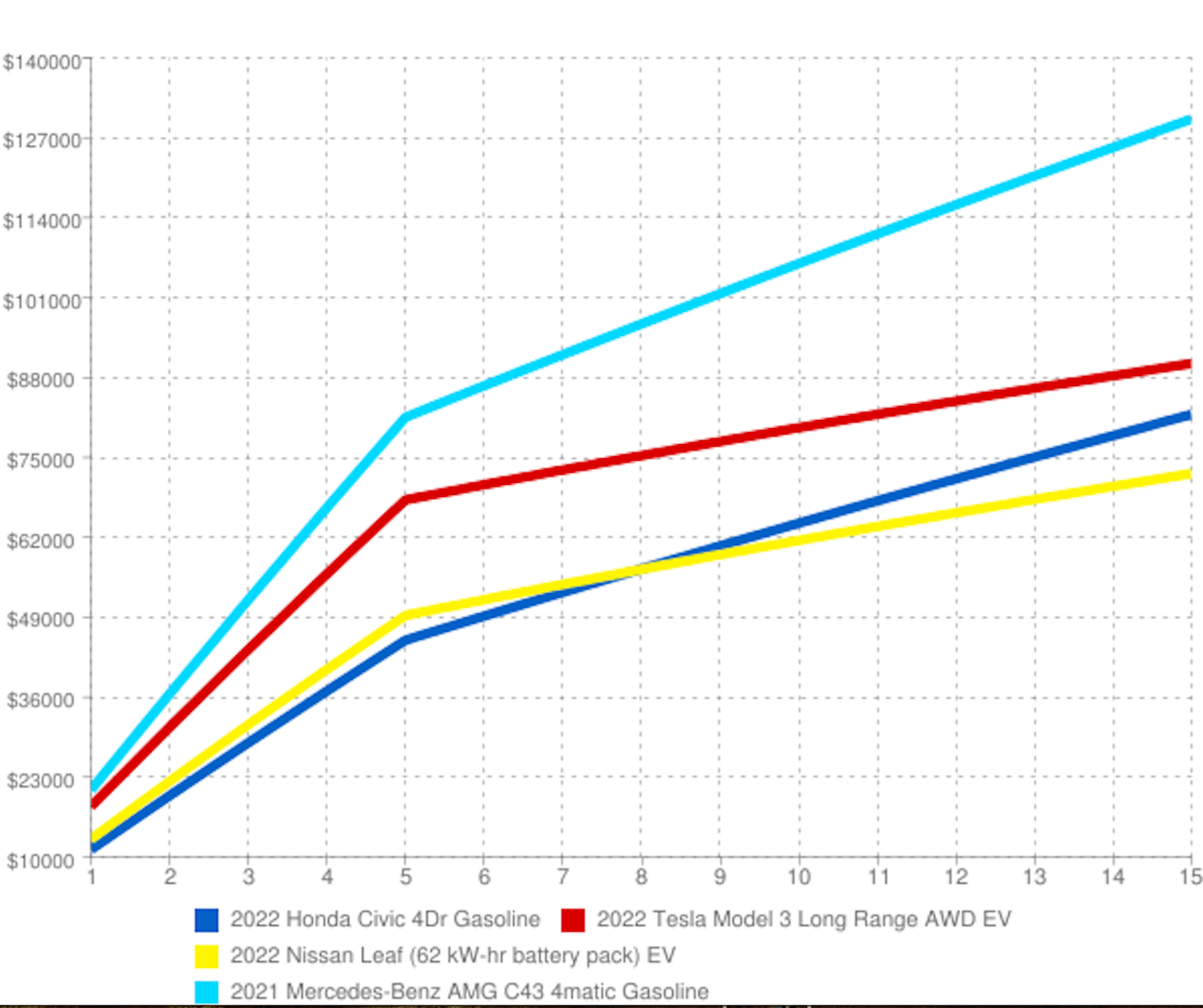Earners,
Electric vehicles are revolutionizing the auto industry - their full-scale adoption is absolutely inevitable.
Should your next car be an EV, though? Is your hard-earned money worth a Tesla? I’m here to help you make that decision a bit easier.

Although there are many EV’s, Tesla still leads the market (credit caranddriver.com)
Show Me The Savings
It's no secret that electric vehicles will trim down your fuel expenses. This is the most evident advantage of EVs.
Even considering the cost of electricity to charge the vehicle, almost every scenario points to savings. Take for instance a fuel-efficient Honda Civic compared to a range of EVs. Assuming an average of 13-14 cents per KWH and 1.50 per litre in gas, EVs come out on top every time. However, there are a few assumptions to consider.
Firstly, you might live in an area where electricity costs are higher. Generally, in the US and Canada, the cost per KWH ranges from 10-20 cents. But in regions where energy costs more or in parts of Europe where energy bills have spiked dramatically, the equation changes slightly. While electricity isn't free, it's generally cheaper than gas, barring a few exceptions.
Secondly, charging could be a problem if you don't have a garage or a dedicated spot for it. Charging stations can take quite a while to fully charge an EV, while refuelling a gas car takes only a few minutes. While this isn't a deal-breaker, it can be inconvenient. As EVs become more mainstream, solutions to these issues will arise.
So, while EVs can offer significant savings on fuel costs, there are some caveats to consider.
How Often Are They In The Shop?
EVs, with their engine-less design and battery operation, have fewer moving parts, leading to fewer problems. Though tires, fluids, and brakes require similar maintenance, oil changes are a non-issue for EVs, giving them yet another advantage.
Anecdotally, I can say with a fairly high degree of confidence that a lot of EV owners (mostly Tesla’s) have had little to no issues with frequent maintenance trips in that department.

This is a few years old, but gives a pretty good glance at overall cost (credit deepwatermgmt.com)
Overall Cost
EV enthusiasts argue that long-term cost savings justify the higher upfront cost, while others believe the savings are overstated.
To settle this, I crunched some numbers myself using various models. I compared a high-end EV, the Tesla Model 3, with a similarly priced Mercedes Benz CLA. I also compared a common Honda Civic with a lower-end Nissan Leaf. I factored in various assumptions such as financing the vehicle for 5 years and average driving distances. What I found was a bit different than the diagram above:

Again, these numbers are from previous years models, but they hold fairly consistent today
When you factor in fuel use and operating costs such as maintenance and insurance, EV’s outshine their counterparts over a 15-year period. This becomes blatantly clear when you compare two vehicles of the same price. Let's take, for instance, two higher-end vehicles with a $50,000 sticker price. Over time, high-end gas vehicles are going to drain your wallet compared to an EV like a Tesla.
Now, most of us are not driving a Tesla or a Benz. A more relatable example is the higher sticker price for a lower-end EV vs a lower-end car like the Honda Civic.
Here's a fascinating point: it isn't until year 8 that the Nissan Leaf begins to outdo the Honda Civic in terms of overall cost.
The reality is that many individuals would be stretching their cash flow thin with a higher upfront purchase price. Regardless of how much I advocate for long-term thinking and decision-making, the short-term considerations of your cash flow, i.e., your monthly bills, are still crucial. Will you even own the car long enough to realize the benefit?
What about a used EV?
What if I can get a cheaper EV? Should I still go for it?
Well, maintenance with EVs is much lower on average, but if something critical like the battery fails and you're not under warranty, you're in for a hefty bill. Moreover, the EV used market isn't as robust as the gas-powered market, making it potentially challenging to find a good deal with a warranty.
However, if you manage to find a fairly priced EV, comparing it to a similarly priced gas-powered vehicle, you're going to save money.
Lastly, let's address the environmental cost, which many claim to care about but often overlook.
In a nutshell, the production of an EV is more taxing on the environment than that of a gas-powered car due to the need for inputs like Lithium and Cobalt. However, as EV manufacturing evolves, this impact is likely to diminish. Moreover, EVs make up for their initial environmental cost over time as they emit NOTHING, whereas gas-powered cars continuously emit to run. So, when you hear criticisms of EVs due to their production, know there's more to the story.
SO SHOULD I GET ONE OR NOT?!
For most people, I don't think so... not yet, and here's why.
EV’s are inevitable - they're set to dominate over the next few decades, and legacy automakers aren't resisting; they're embracing it.
However, we're in the infancy of this industry, and pricing is generally unaffordable for many, even considering long-term cost benefits. But as mass market adoption increases and further innovation flourishes, costs will decrease significantly, making EVs more affordable.
Now, if you can find that great deal, are a high earner, have a place to charge it and it checks all the boxes, then by all means, get one. I’m even thinking of getting one myself. These cars are incredible, and I wholeheartedly endorse that, assuming your budget allows for it.
But let's be brutally honest: EVs are only going to get better and more affordable over the next few years, so from a financial perspective, there's no rush to get one.
It’ll Happen Eventually
Assuming you're relatively young, you'll eventually get an EV at some point in your life. But does that need to be your next car? I don't believe so.
Regardless of anything I've said, make sure to run the numbers, know your cash flow, and weigh in other considerations like the environment and driving experience. As always, make the best decision for you.
Earn more,
Nate

